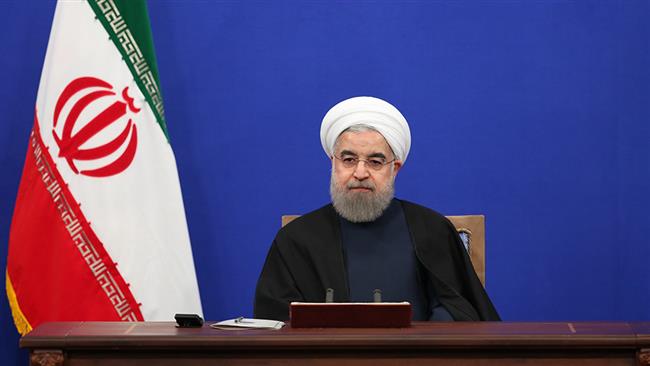PHOTO: President Rouhani at his televised press conference on Tuesday
WEDNESDAY FEATURE
Trying to bolster his position and that of the July 2015 nuclear agreement, Iran’s President Hassan Rouhani has hailed the first anniversary of the deal’s implementation; however, he has also cautioned the US about ongoing restrictions and any attempt to tear up the document.
The deal with the 5+1 Powers (US, UK, Britain, France, Germany, and China) has been a high point of Rouhani’s Presidency, welcomed by most Iranians. But he remains under pressure from hardliners who have accused him and his Government of weakness towards the Americans.
Rouhani told 200 reporters at a televised press conference on Tuesday that the agreement was “a great national achievement”:
Very few pundits believed that the issue of PMD [possible military dimensions) would be resolved, and the International [Atomic Energy] Agency would admit that Iran’s outstanding issues had ended….The closure of this dossier amounted to a moral victory for the great Iranian nation.
The President asserted that all sanctions have been removed, but he then acknowledged that the US has continued financial restrictions, limiting Iran’s banking transactions with the rest of the world.
The American regulations have hindered Rouhani’s attempts at breakthrough arrangements marking Iran’s economic recovery, such as the purchase of aircraft for its passenger fleet. Tehran has also struggle to complete agreements for renewed foreign investment in the oil and gas sector.
Still, Rouhani said Iran “is standing with great might and powerfully against” any violations of the agreement while declaring, “We have not acted and will not act hastily, because national interests are a principle for us and we will always bear in mind these interests.”
The President repeated the regime’s line that incoming US President Donald Trump should not abandon or modify the deal, “The JCPOA [Joint Comprehensive Plan of Action] is not a mutual agreement [but] a multilateral agreement. Therefore, it will be meaningless if we wanted to negotiate on the JCPOA anew. There will be no new negotiations.”
Turning to his domestic critics, Rouhani again said that, if the deal had not been signed, Iran faced economic collapse. He said that Iran could now sell $70 billion of oil in a year:
Without the deal, that would have been $32 or $33 billion. If not for the deal, where would we have deducted this money from? From nurses’, from teachers’ salary? Put health and treatment projects on hold?
What were we to do?
Reconciliation with Saudi Possible
In other remarks, Rouhani said an easing of tensions with Saudi Arabia is possible, but depends on Riyadh halting its military intervention in Yemen’s civil war.
The President promoted his foreign policy of “engagement” through the forging of close ties with neighboring countries, including the Gulf States. He added that countries such as Iraq and Kuwait have tried to mediate, and that if Saudi officials “take up the right path and make correct decisions”, Tehran is ready to help.
He then set the condition, “Saudi Arabia must stop strikes on Yemen as soon as possible,” and added that Saudi intervention in other areas such as Bahrain is an Iranian conceern.
Rouhani’s pursuit of engagement has always been contained by Iranian hardliners, and it was damaged in early 2016 by the Saudi breaking of relations, following Riyadh’s execution of a prominent Shia cleric and the attack by a crowd on the Saudi Embassy in Tehran. Last week, the President suffered another blow with the death of former President Hashemi Rafsanjani, a leading advocate of reconcilation with Riyadh.

